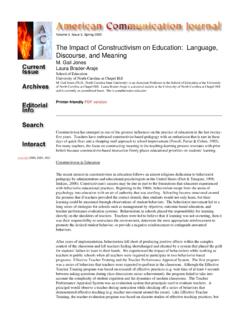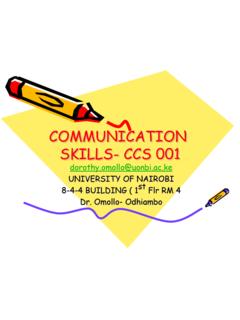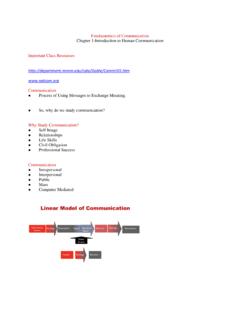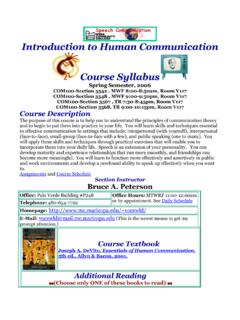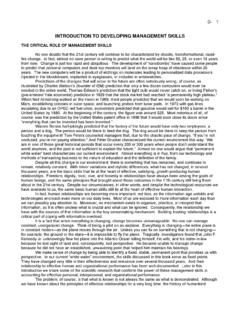Transcription of 24 Business Communication Skills: Attitudes of Human ...
1 4 _____ 24 business communication skills : Attitudes of Human Resource Managers versus Business Educators David Conrad Augsburg College Robert Newberry Winona State University ABSTRACT This study examined the perceptions of Human resource managers and Business school instructors regarding the importance of 24 specific Business Communication skills . Previous studies indicated broad agreement regarding the importance of student/employee Communication abilities to achieve successful job performance. Yet the literature also suggested that different objectives may elicit dissimilar opinions regarding specific types of skills that constitute the ability to communicate effectively.
2 In response to the need for more precise Communication skills characterization, Conrad (2003) developed three skills sets based on the widely accepted Communication constructs of organizational, leadership and interpersonal Communication abilities. The results from this study show that Business leaders and Business instructors agree on the importance of overall student/employee Communication ability; however, they vary significantly regarding the importance of individual skills . _____ David Conrad is Assistant Professor and Associate Director for the Augsburg College MBA program.
3 Robert Newberry is Professor of Marketing at Winona State University. Send correspondence to David Conrad, Augsburg College, 3415 Chalet View Lane, Rochester, MN 55901, American Communication Journal 2011 SPRING (Volume 13, Issue1) 5 Business Communication is the sending and receiving of verbal and non verbal messages within the organizational context (Roebuck, 2001; Ober, 2001; Murphy, Hildebrandt, & Thomas, 1997). Hanna and Wilson (1998) expanded on this definition, indicating Business Communication is a process of generating, transmitting, receiving, and interpreting messages in interpersonal, group, public, and mass Communication contexts through written and verbal formats.
4 Hynes (2005) stated effective Business Communication is the key to planning, leading, organizing, and controlling the resources of the organizations to achieve objectives, and may be formal or informal in nature. Argenti (2007) discussed Business Communication functional aspects and found that over half of the heads of corporate Communication departments oversee Business communications functions that include media relations, online communications, marketing, special events, product/brand communications, crisis management, employee/internal communications, community relations, and product/brand advertising.
5 The expanse and importance of Business Communication underscores the need for Business education and Business to collaborate in preparing Business majors for the workplace. It is widely accepted that Business management and Business educators perceive Communication skills as highly valuable to employees and organizations alike. In Business organizations, numerous sources have reported that Communication skills are critical to career success and a significant contributor to organizational success (Du-Babcock, 2006; Roebuck, 2001; Certo, 2000; Dilenschneider, 1992; Rushkoff, 1999).
6 In academia, research has shown faculty and administrators perceive that Communication skills are very important to students eventual career success (National Association of Colleges and Employers, 2001; Gray, 2010). Despite the agreement in Business regarding the importance of Communication skills , evidence exists that long-term employees and those just entering the work force from college still lack these skills . Pearce, Johnson, and Barker (1995) reported fair to poor (the lowest two categories on a 5- point scale) Communication and listening skills of managers and employees.
7 Fordham and Gabbin (1996) interviewed 84 Business executives and concluded that Business students with apprehension about communicating are less likely to practice the Communication and, therefore, are less likely to develop Communication skills . Academicians appear to agree with their Business counterparts. Lanier, Tanner, Zhu, and Heady (1997) found that most management faculty believe students are deficient in writing and verbal skills . Their study also revealed that although remediation in these skills is at the forefront of educational needs, students may not be receiving adequate education in these skills .
8 Young and Murphy (2003) noted that accreditation requirements, academic research, and consistent feedback from employers, college recruiters, and alumni certainly suggest that Communication skills should be identified as one of the key issues in marketing education. Brodowsky and Anderson (2003) found that even Business students themselves perceive inadequacies in their Communication education. So, despite agreement between Business and academia regarding the importance of Communication skills , a gap persist regarding desired versus acquired Communication skills levels.
9 Several studies reveal that Business education should be sensitive to, but may not understand, the Communication skills needs of Business employees (Roebuck, 2001: Tanyel, Mitchell, & McAlum, 1999; Lanier, Tanner, Zhu & Heady, 1997). Gray (2010) found graduates often begin their careers with inadequate oral Communication skills , but there is a lack of well- 6 grounded empirical data concerning precisely what employers mean by oral Communication and what specific skills they value most highly. Sapp and Zhang (2009) suggested Business professors think they know about their students readiness for post-graduation employment, but the reality often is that professors know very little about how their students will perform professionally in relation to what industry expects.
10 The authors argued that rarely do Business faculty have the opportunity to incorporate feedback from industry insiders in order to facilitate their students transition to full-time employment; that occasionally, academicians conduct alumni surveys or obtain feedback in program reviews or accreditation reports; but that most of the time, the information available about their students Communication skills performance outside the classroom is either anecdotal or based on a small sampling of student work. Thus, Business faculty can only assume and hope that the career-oriented education they provide as Business Communication teachers will translate into successful job performance.

